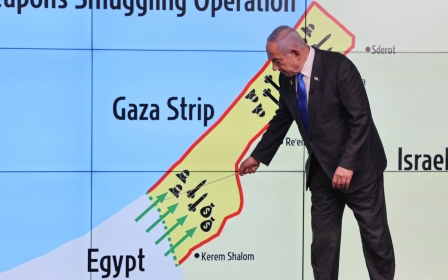US: Critics urge Congress to block release of $320m in military aid to Egypt

The Biden administration has decided to release $320m in military aid to Egypt - a package previously contingent on improving human rights issues in the country.
Unless Congress steps in, this brings the total amount from Washington to Cairo this year to $1.3bn. Egypt has long been the second-highest recipient of US military aid after Israel.
The administration notified Congress of the move on Wednesday, after Secretary of State Antony Blinken invoked his waiver power to approve the funds. The amount included a $95m portion requiring special certification because it was conditioned on “clear and consistent progress” regarding the release of political prisoners in Egypt.
In a statement, the Middle East Democracy Center, a Washington-based advocacy group, called the decision a “betrayal” by an administration that pledged to make human rights central to the US-Egypt bilateral relationship.
“We therefore call on Congress, as it has done the last two years, to fulfill its oversight duty, and block all $320 million conditioned on human rights benchmarks,” MEDC said.
New MEE newsletter: Jerusalem Dispatch
Sign up to get the latest insights and analysis on Israel-Palestine, alongside Turkey Unpacked and other MEE newsletters
“At a minimum, Congress should block the $95 million, which the administration baselessly and unjustifiably determined that the Egyptian government has made ‘clear and consistent progress’ in releasing detainees and providing them due process.”
Congressional precedent
This time last year, Ben Cardin, the chairman of the Senate Foreign Relations Committee, blocked $235m in military financing for Egypt over those very same concerns. The year before that, now-retired Senator Patrick Leahy - the creator of the Leahy Law that makes it illegal to fund military units accused of rights violations abroad - blocked a $75m transfer to Egypt.
Seth Binder, the advocacy director at MEDC, told MEE he’s optimistic Congress can step up again.
'In [the administration’s] public comments, they don't really even make a justification that Egypt needs these funds for its own security'
- Seth Binder, MEDC
A US State Department spokesperson told MEE that the release of the funds “is important to advancing regional peace and Egypt’s specific and ongoing contributions to US national security priorities, particularly to finalise a ceasefire agreement for Gaza, bring the hostages home, surge humanitarian assistance for Palestinians in need, and help bring an enduring end to the Israel-Hamas conflict.”
The spokesperson added that the decision reflects Egypt’s "crucial role" in promoting a ceasefire in Sudan and its humanitarian assistance to the Sudanese people.
When asked about changes in Egypt that prompted the decision, the spokesperson told MEE that Blinken’s waiver is “acknowledging steps the Egyptians have already taken: advancing draft legislation to reform pre-trial detention and the broader penal code for adoption by parliament, releasing more than 950 political prisoners since September 2023, and to end travel bans and asset freezes associated with foreign funding for NGOs.”
Egypt 'failed' the test
Two Democrats and longtime Biden allies on the Senate Foreign Relations Committee said they are concerned by the certification of the $95m to Egypt, writing in a joint statement that the Egyptian government “has failed that test”.
“Over the last year, for every single political prisoner Egypt has released, it has jailed two more,” Senators Chris Murphy and Chris Coons said.
“And among the thousands and thousands of political prisoners the government has continued to refuse to release are two US legal permanent residents, Hosam Khalaf and Salah Soltan.”
Human rights groups have called the arrests of Khalaf and Soltan “arbitrary” and “hostage-like”. Their families have been urging the White House to take up their case.
“The illusion that the United States can use its military aid to these regimes as leverage for the dictatorships and the abusive regimes to improve themselves is a joke,” Raed Jarrar, advocacy director with Democracy for the Arab World Now (Dawn) told MEE.
“There is no way for el-Sisi to reform el-Sisi. There is no way for Netanyahu to reform Netanyahu. These things are not going to happen."
Middle East Eye delivers independent and unrivalled coverage and analysis of the Middle East, North Africa and beyond. To learn more about republishing this content and the associated fees, please fill out this form. More about MEE can be found here.





